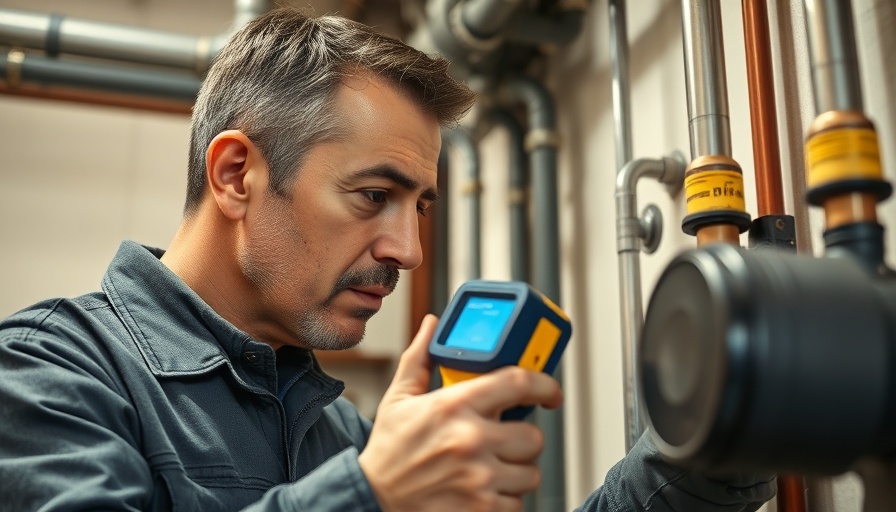
Understanding the Role of Home Inspectors in Gas Leak Detection
When it comes to home safety, gas leaks are a concern that homeowners cannot afford to overlook. Home inspectors play a crucial role in identifying potential hazards during property assessments. While most inspectors rely on their sense of smell to detect gas odors, the methods they employ can vary widely. Some inspectors utilize advanced tools like combustible gas detectors or leak detection fluids, while others may not have access to such technology.
Importantly, inspectors are typically limited in the scope of their inspections. Visible gas lines, connections, and appliances like furnaces and water heaters are most often examined, but inaccessible lines behind walls or under floors might remain unchecked. Any leaks detected will be noted in the inspection report, along with recommendations for further evaluations by qualified professionals, such as plumbers or gas companies.
Health Risks Associated with Gas Leaks
Gas leaks, particularly from natural gas or propane, pose severe health risks. These gases are colorless and largely odorless, but the added chemical mercaptan gives them a distinctive sulfuric smell to aid detection. Recognizing this odor is vital, as inhaling gas can lead to headaches, dizziness, and severe cases, even gas poisoning. Methane, a primary component of natural gas, can displace oxygen in the air, creating dangerous atmospheric conditions within enclosed spaces.
In situations where a gas leak is suspected, it is vital to act swiftly. The gas company can proffer advice on safety measures, while a licensed plumber or gas technician equipped with a combustible gas detector can conduct a detailed evaluation.
Common Locations for Gas Leaks
Gas leaks are often found in specific areas of a home. According to home inspectors, some of the most common culprits include obsolete gas valves, unions, and flare fittings. Old-style gas valves, commonly used in older homes, can leak if they are not properly maintained or replaced. Furthermore, incorrect installation or tightness of unions can lead to gas escaping, revealing the importance of careful inspection in older homes, especially in regions like Minneapolis and Saint Paul.
Detecting Gas Leaks: Tools and Techniques
Home inspectors utilize various methods to detect gas leaks. Among these, electronic gas detectors, often referred to as 'gas sniffers,' are vital. These devices can sense even minuscule amounts of gas, making them invaluable during inspections. However, they can also produce false positives, such as when fresh pipe dope causes alarms to ring.
In many cases, inspectors will use multiple techniques for verification. If a leak is suspected, the inspector may apply a gas leak detection solution, which bubbles if gas is present, confirming any suspicion raised by odor or electronic detector readings.
Limitations of Home Inspections and Best Practices
While home inspectors perform comprehensive evaluations, they are not specialists in gas detection. Home inspections generally cover a broad range of issues, and as such, inspectors may lack the equipment or experience required for specialized gas assessments. Homeowners should communicate their concerns about gas leaks to their inspectors clearly to ensure a thorough examination is conducted.
For comprehensive safety, homeowners should maintain regular checks and service of their gas appliances. This proactive approach can prevent potential leaks and ensure that all diagnostic inspections are carried out by certified professionals, upholding industry standards for safety.
Future Trends: The Need for Specialized Inspectors
As awareness around gas leaks grows, there is a noticeable trend toward hiring specialized inspectors who can focus exclusively on gas safety. This evolution in the home inspection market may provide homeowners with a clear advantage, ensuring a stricter adherence to safety protocols and providing more detailed assessments and recommendations.
With ongoing advancements in technology, future gas detection tools are likely to become more sophisticated and accessible, allowing inspectors and homeowners alike to rapidly identify and address potential gas leaks with greater accuracy.
Conclusion
Gas leak detection is a critical component of home safety, demanding attention from both homeowners and inspectors. Understanding the limitations and methodologies involved can empower homeowners to make informed decisions, ensuring that their families remain safe from potential gas hazards. By prioritizing regular inspections and enlisting the help of specialized professionals when necessary, homeowners can fortify their peace of mind and protect their homes.
Are you concerned about gas safety in your residence? Don’t hesitate to reach out to certified home inspectors who can provide greater insight into your gas leak detection options. Ensure your home remains a safe haven by scheduling your inspection today!
#gasleaksafety, #detectgasleaks, #homeinspectorgas, #gasdetectiontools, #gasleakrisks, #commonleakspots, #inspectionchallenges, #gasleakprevention, #futuregasdetection, #gasinspectors
 Add Row
Add Row  Add
Add 




 Add Row
Add Row  Add
Add 


Write A Comment